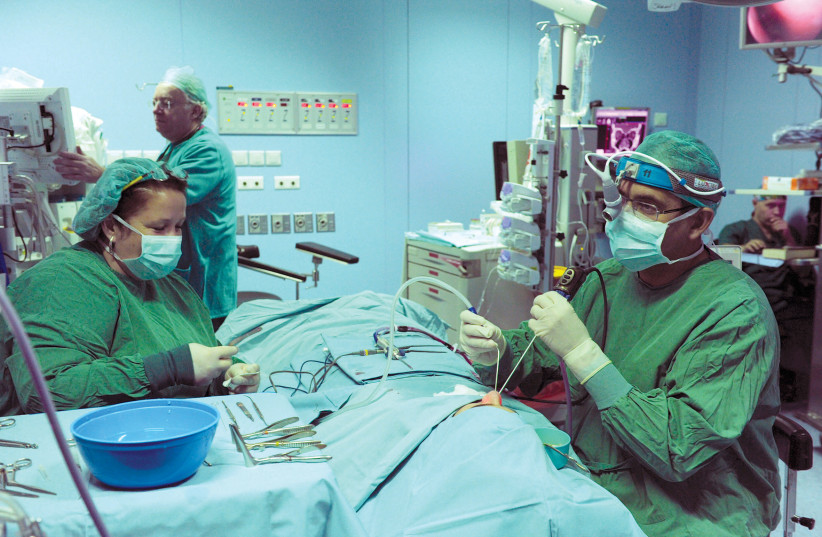Dr. Ariel Lipschuetz, an anesthesiologist at Hadassah-University Hospital on Mount Scopus in Jerusalem who often serves as a rescue doctor in various ski resorts around the world, never dreamed that one day he would be nearly paralyzed on the slopes in the French Alps and need such assistance himself.
The 39-year-old physician went to the Val Thorens ski resort with a friend for a short vacation,” Lipschuetz recalled. “It was a friendly site and not known to be particularly challenging. Families with children come there and surfing the slopes is safe. The start of the vacation was amazing and we enjoyed every minute. I never imagined, even for a second, how this vacation would end.”
On a hill that was not very high, he suddenly flew to a great height in the air and landed on his back. The pain was extreme; he could barely speak or move; and he felt completely helpless. He was taken off the mountain on a rescue mattress with an emergency team, and the movements and potholes were excruciating.
“During the ambulance drive, I started to sweat and had trouble breathing; all signs indicated that my body was in shock. I am a doctor; I knew the signs and knew that whoever was treating me could only note them when using monitoring equipment, which was not present in the ambulance. While experiencing the severe symptoms, I tried to explain to the medical staff who accompanied me that my condition was not good and that my body was in shock, but they did not understand English. In despair, I realized that all my experience and knowledge did not help in those moments. When I arrived at the local hospital, I realized my condition was awful and I still couldn’t move. The back injury was significant,” he remembered.
Lipscheutz gets help from a friend
He called Dr. Josh Schroeder, director of Hadassah’s back unit who was fortunately only about 26 kilometers away from him in La Tossari, where he was skiing with his family. Schroeder saw the x-rays and realized that Ariel had to undergo surgery in Israel and not in France. “I saw that he had a fractured back vertebrae that could cause him to become paralyzed.”

“Spinal cord injuries are dangerous and require a professional team and advanced equipment to treat them,” said Schroeder. “Ariel called me, and I immediately understood his distress and his difficult situation, The day before, my 12-year-old daughter injured her ankle while skiing. I took her to the local clinic for an X-ray. There I saw how old and not advanced is the medical equipment, so far from what we have at Hadassah.
"Together with Dr. Ohad Einav from the orthopedic complex and anesthesiologist Dr. Stefan Ledot, the Hadassah team performed a robotic percutaneous fixation surgery on the complex fracture of Lipschuetz’s back so that he could get up and move around as he did until today, before the injury,” Schroeder said. “Fortunately, his recovery was quick, and he is already on his feet. Professional staff and advanced technology are the keys to successful surgeries, and we at Hadassah have the whole package.”
Standing on his two feet and smiling, Lipschuetz concluded: “I didn’t doubt that I was in the best hands from the moment Dr. Schroeder took matters into his own hands. The medical staff embraced me every moment. At Hadassah, we always emphasize that the patient is at the center, and this time I felt what it was like to be on the receiving end and not on the giving side.”
